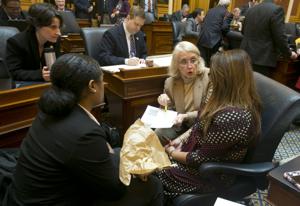Legislation to tax businesses’ PPP loans advancing through Virginia Legislature

(The Center Square) – Members of the Virginia business community are voicing concern over legislation that would require small businesses to pay state income taxes on forgivable loans received by the federal government as they are trying to recover from the COVID-19 pandemic and subsequent economic restrictions.
Because Virginia is a state that does not automatically conform its state tax code to the federal tax code, it must introduce tax conformity legislation annually. Although normally a routine matter, a House committee has advanced legislation that would conform conform parts of the code. One part that’s left out of the bill is an income tax exemption for Paycheck Protection Program (PPP) loans, which are tax exempt at the federal level.
Del. Vivian Watts, D-Annandale, the sponsor of House Bill 1935, said during a committee meeting that fully conforming to the federal income tax code would cause a $1 billion budget deficit for the state. Virginia, she noted, is required to pass a balanced budget every year, but the federal government is not.
Finance Secretary Aubrey Lane told lawmakers the state tried to conform to as much of the tax code as it could, but recent federal changes have made it difficult. In the proposed bill, the state would conform to most of the individual tax provisions, but it will deconform from many of the business tax provisions. Some of the deconformity is from recent COVID-19-related changes to the tax code and others from the 2017 Tax Cuts and Jobs Act.
The possibility that the state will not fully conform to the federal tax code has caused concern for businesses that have lost revenue during the pandemic and have to face a gradual minimum wage hike beginning in May.
The Virginia state director for the National Federation of Independent Business, Nicole Riley, cautioned that not exempting PPP loans would have a negative effect on the 113 businesses that took out these loans.
“This is a money grab from the pockets of suffering small businesses who lost so much revenue when they were closed by the government and through no fault of their own,” Riley said. “The legislature just wants more money to spend but with this bill, that cost falls on the backs of small business owners.
“Small businesses took PPP loans when the government shutdown the economy and the goal was to save employee’s jobs and keep them off the unemployment rolls,” Riley said. “The business owners followed all the rules and carried out their end of the bargain. Essentially, the state is kicking them when they are down.”
Robert Melvin, the director of government affairs at the Virginia Restaurant, Lodging & Travel Association, told The Center Square his organization is disappointed in the legislation. He said any additional burden will hurt small businesses and likely will require some of them to lay off employees or reduce hours.
Melvin said state changes to federal law regarding businesses will have a collective impact that will damage small businesses. The minimum wage is set to increase from $7.75 per hour to $9.50 per hour in May, but Melvin said people really will see the negative effect on businesses the following year, when the minimum wage goes up to $11 per hour in January. The association is fighting to slow down the increase.
“None of this should be looked at individually,” Melvin said.
Stephen Haner, a senior fellow for state and local tax policy at the free-market Thomas Jefferson Institute for Public Policy, told The Center Square the state should not be taxing the COVID-19 relief.
“This Northam Administration says this could be close to half a billion dollars over two years, which I consider as the state taking a 6% skim off the top of money Congress was and is using to save our economy,” Haner said. “It is no different than if the state tried to tax the individual stimulus payments, but they don’t dare try that. I think they were hoping the business community would just lie down and take this. The state is getting billions, billions of extra funds from the federal taxpayers and should not be taxing this relief.”
Republicans have urged the state to exempt these loans from taxation, but Democrats have a majority in both chambers of the General Assembly.
Disclaimer: This content is distributed by The Center Square

